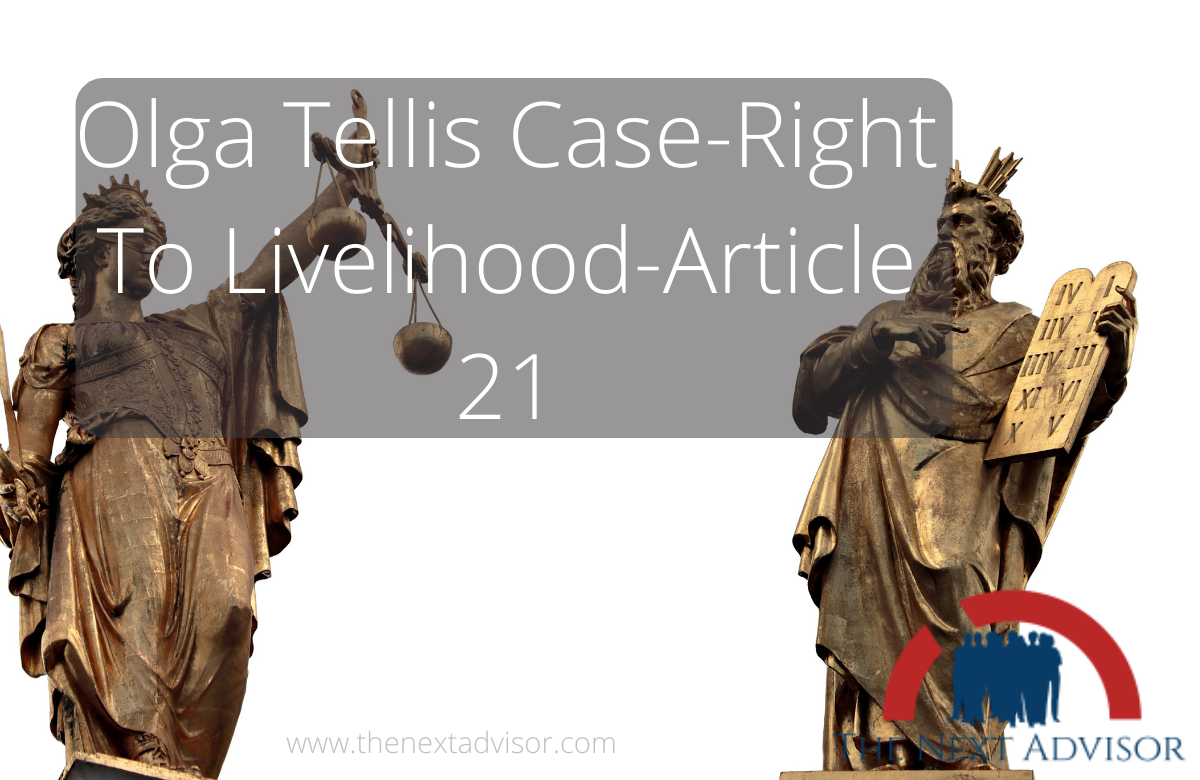This case will be dedicated to such a landmark judgment which tools for the Fundamental Rights of the migrated people. The name of that case is (Olga Tellis Case-Right to livelihood) Olga Tellis Vs. Bombay Municipal Corporation, 1985. What are the facts of this case, what was the question of law? before the Honorable Supreme Court. And what was held in this particular case? So this case concerns itself with the plight of pavement and slum-dwellers of the large metropolitan city.
Introduction / Facts of Olga Tellis Case-Right To Livelihood
Every year thousands of people come to Mumbai in search of work we called them migrated people/workers. For their own convenience, they usually use preference staying near to their workplace. In this case, a writ petition was filed by Journalist Olga Tellis and two pavement dwellers, who established the following order of eviction and deporting of slum and pavement dwellers passed by the Government of Maharashtra sighting the Bombay Municipal Act 1888.
The second group of petitioners whose plea was heard along with this petition belonged to two different slums and alleged that attempts were made to deport them from their place of settlement even though they had obtained an order of injunction restraining the officer of the State Government from carrying deport thought the directives of the abovementioned order of eviction.
what were the questions of law in this particular case? i.e., Olga Tellis Case-Right To Livelihood
The question of law before the honorable Court in this case (Olga Tellis Case-Right To Livelihood) was whether within the ambit of Article 32 of the Indian Constitution estoppel can be obtained against the enforcement of the fundamental rights? Whether forcible eviction and uprooting of their settlement deprived some dwellers of their livelihood?
And consequently, their Right to live is guaranteed under Article 21 of the Indian Constitution?. And is further in violation of their right to occupation and right to settle as given in articles 19(1) (e) and Article 19 (1) (g) of the Indian Constitution.
Also, the question was whether the law is let down in Section 314 R/w Section 312, Section 313 of Bombay Municipal Corporation Act?. Which empowers the Municipal Commissioner to remove any object or structure set up on a street without notice is reasonable. Was that order fair and just? These were the question before the Honourable Court.

Right To Livelihood
What was held in this particular case? (in Olga Tellis Case-Right To Livelihood)
Opinion of the Court regarding these questions of law in Olga Tellis Case-Right To Livelihood
The Honourable Supreme Court held that the Petitions were maintainable under Article 32 of the Indian Constitution. Which gives one to Right to approach the Supreme Court and knock on the door of the Supreme Court directly in case of violation of the Fundamental Rights. And that there can be no estoppel suit against the constitution.
The Court held that ” No individual can barter away the freedoms conferred upon him by the Constitution. A concession made by him in a proceeding, whether under a mistake of law or otherwise, that he does not possess or will not enforce any particular fundamental right, cannot create an estoppel against him in that or any subsequent proceedings”. Such a concession, if enforced, would defeat the purpose of the Constitution.
The next question of law that the Court address related to Article 21 of the Indian Constitution which reads, Protection of life and personal liberty, No person shall be deprived of his life or personal liberty except according to procedure established by law the contention whether Right to life means Right to livelihood was cleared when the Supreme Court unequivocally stated that Right to life would be meaningless without ensuring means of livelihood.?
The Court further held, ” No person can leave without the means of living, that is, the means of livelihood. The right to livelihood is not treated as the part of Constitutional Right to life”. The easiest way of Depriving a person of his Right to life would be to deprive him of his means of livelihood to the point of abrogation. Such deprivation would not only denude the life of his effective content and meaningfulness but it would make life impossible to live.
And yet such deprivation would not have to be in accordance with the procedure established by law if the right to livelihood is not regarded as part of the Right to life. Giving consideration to the plight of government and slum dwellers and the economic compulsions that force them to live an abysml life the Supreme court further held that,
“The right to occupation as well as the right to settle as in Article 19(1)(e) & in Article 19 (1)(g) has been violated by the Bombay Municipal Corporation Act 1888, as eviction from their dwelling. However, might be we lead to disruption of their occupation and settlement.
The court held that if there is an obligation upon the state to secure the citizen an adequate means of livelihood and the right to work it would be shield pedantry to exclude the right to livelihood from the country from the content of the right to life.
Suggestions and Judgment of the Court regarding Olga Tellis Case-Right To Livelihood
Coming to the second part of Article 21 regarding Procedure established by law. The court held that Section 314 was a set valid law and not unreasonable in any way. As the provision given was enabling nature and not a compulsion wherein it conferred upon the officer the right to demolish without notice. The court however also specified that such a need had to be judged carefully and exercise only when no other option was available.
In the current case, the court said that the right to be heard ought to have been extended to the pavement dwellers i.e., notice ought to have been served before eviction. In the light of this reasoning, the court passed out the order of eviction long with an offer of alternative features with a month’s notice of the extent to the pavement dwellers.



























